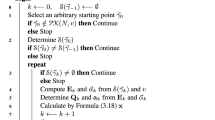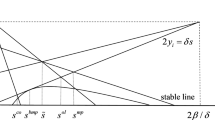Abstract
The generalized Nash equilibrium problem (GNEP) is a generalization of the standard Nash equilibrium problem, in which each player’s strategy set may depend on the rival players’ strategies. The GNEP has recently drawn much attention because of its capability of modeling a number of interesting conflict situations in, for example, an electricity market and an international pollution control. However, a GNEP usually has multiple or even infinitely many solutions, and it is not a trivial matter to choose a meaningful solution from those equilibria. The purpose of this paper is two-fold. First we present an incremental penalty method for the broad class of GNEPs and show that it can find a GNE under suitable conditions. Next, we formally define the restricted GNE for the GNEPs with shared constraints and propose a controlled penalty method, which includes the incremental penalty method as a subprocedure, to compute a restricted GNE. Numerical examples are provided to illustrate the proposed approach.
Similar content being viewed by others
References
Arrow KJ, Debreu G (1954) Existence of an equilibrium for a competitive economy. Econometrica 22: 265–290
Aubin JP (1979) Mathematical methods of game and economic theory. North-Holland, Amsterdam
Borwein JM, Lewis AS (2006) Convex analysis and nonlinear optimization: theory and examples, 2nd edn. Springer, Heidelberg
Breton M, Zaccour G, Zahaf M (2006) A game-theoretic formulation of joint implementation of environmental projects. Eur J Oper Res 168: 221–239
Contreras J, Klusch M, Krawczyk JB (2004) Numerical solutions to Nash-Cournot equilibria in coupled constraint electricity markets. IEEE Trans Power Syst 19: 195–206
Debreu G (1952) A social equilibrium existence theorem. Procee Natl Acad Sci 38: 886–893
Di Pillo G, Grippo L (1989) Exact penalty functions in constrained optimization. SIAM J Control Optim 27: 1333–1360
Facchinei F, Fischer A, Piccialli V (2007) On generalized Nash games and variational inequalities. Oper Res Lett 35: 159–164
Facchinei F, Fischer A, Piccialli V (2009) Generalized Nash equilibrium problems and Newton methods. Math Program 117: 163–194
Facchinei F, Kanzow C (2007) Generalized Nash equilibrium problems. 4OR 5: 173–210
Facchinei F, Pang J-S (2003) Finite-dimensional variational inequalities and complementarity problems, vol 2. Springer, New York
Facchinei F, Pang J-S (2006) Exact penalty functions for generalized Nash problems. In: Di Pillo G, Roma M (eds) Large-scale nonlinear optimization. Springer, Heidelberg , pp 115–126
Fukushima M (2007) A class of gap functions for quasi-variational inequality problems. J Ind Manage Optim 3: 165–171
Han S-P, Mangasarian OL (1979) Exact penalty functions in nonlinear programming. Math Program 17: 251–269
Harker PT (1991) Generalized Nash games and quasi-variational inequalities. Eur J Oper Res 54: 81–94
Haurie A, Krawczyk JB (1997) Optimal charges on river effluent from lumped and distributed sources. Envir Model Assess 2: 177–189
Hobbs BF, Pang J-S (2007) Nash-Cournot equilibrium in electric power markets with piecewise linear demand functions and joint constraints. Oper Res 55: 113–127
Kesselman A, Leonardi S, Bonifaci V (2005) Game-theoretic analysis of internet switching with selfish users. In: Proceedings of the First International Workshop on Internet and Network Economics, WINE. Lecture Notes in Computer Science, vol 3828, pp 236–245
Krawczyk JB (2005) Coupled constraint Nash equilibria in environmental games. Resour Energy Econ 27: 157–181
Krawczyk JB (2007) Numerical solutions to coupled-constraint (or generalised Nash) equilibrium problems. Comput Manage Sci 4: 183–204
Krawczyk JB, Uryasev S (2000) Relaxation algorithms to find Nash equilibria with economic applications. Environ Model Assess 5: 63–73
Nabetani K, Tseng P, Fukushima M (2009) Parametrized variational inequality approaches to generalized Nash equilibrium problems with shared constraints. Comput Optim Appl. doi:10.1007/s10589-009-9256-3
Nikaido H, Isoda K (1955) Note on noncooperative convex games. Pac J Math 5: 807–815
Pang J-S, Fukushima M (2005) Quasi-variational inequalities, generalized Nash equilibria, and multi-leader-follower games. Comput Manage Sci 2: 21–56
Pang J-S, Scutari G, Facchinei F, Wang C (2008) Distributed power allocation with rate constraints in Gaussian parallel interference channels. IEEE Trans Infor Theory 54: 3471–3489
Robinson SM (1993) Shadow prices for measures of effectiveness, I: Linear model. Oper Res 41: 518–535
Robinson SM (1993) Shadow prices for measures of effectiveness, II: General model. Oper Res 41: 536–548
Rosen JB (1965) Existence and uniqueness of equilibrium points for concave N-person games. Econometrica 33: 520–534
von Heusinger A, Kanzow C (2009) Optimization reformulations of the generalized Nash equilibrium problem using Nikaido-Isoda-type functions. Comput Optim Appl. doi:10.1007/s10589-007-9145-6
Wei J-Y, Smeers Y (1999) Spatial oligopolistic electricity models with Cournot generators and regulated transmission prices. Oper Res 47: 102–112
Author information
Authors and Affiliations
Corresponding author
Additional information
This work was partially supported by a Grant-in-Aid for Scientific Research from Japan Society for the Promotion of Science.
Rights and permissions
About this article
Cite this article
Fukushima, M. Restricted generalized Nash equilibria and controlled penalty algorithm. Comput Manag Sci 8, 201–218 (2011). https://doi.org/10.1007/s10287-009-0097-4
Received:
Accepted:
Published:
Issue Date:
DOI: https://doi.org/10.1007/s10287-009-0097-4




